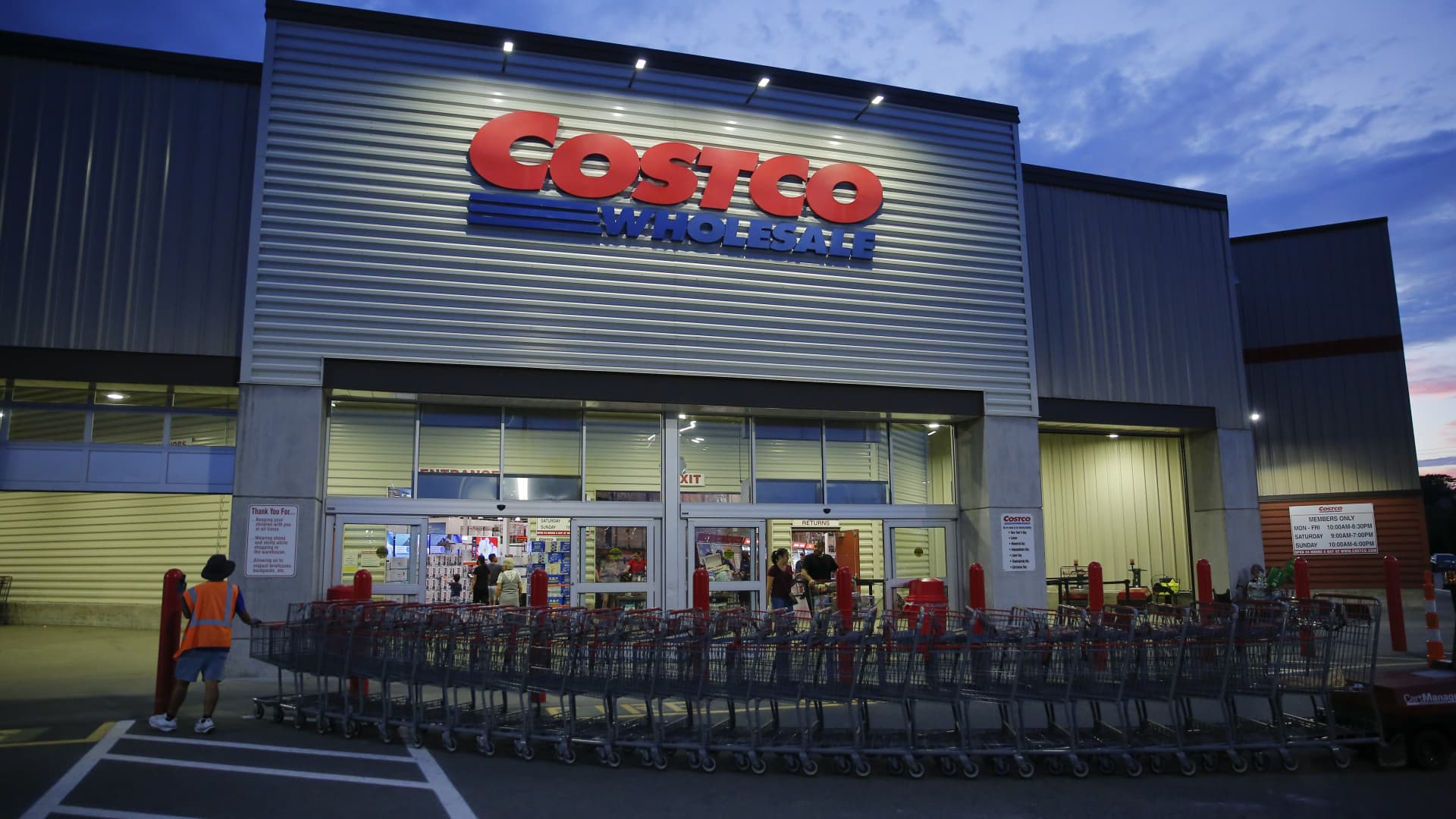Costco on Tuesday reported quarterly earnings that topped Wall Street’s expectations, as shoppers turned to the membership club for groceries but bought fewer big-ticket items.
On an earnings call, Chief Financial Officer Richard Galanti said shoppers made more trips to the retailer’s stores, even as they spent less. He said sales of pricier items in the U.S., outside of food, were weaker and falling gas prices also weighed on revenue.
Traffic rose 5.2% worldwide and 5% in the U.S. on a year-over-year basis. Costco’s average transaction amount in the quarter dropped nearly 4% worldwide and 4.5% in the U.S., he said.
Here’s what the membership-based warehouse club reported for the three-month period that ended Sept. 3 compared with what analyst were expecting, according to consensus estimates from LSEG, formerly known as Refinitiv:
- Earnings per share: $4.86 vs. $4.79 expected
- Revenue: $78.9 billion vs. $77.9 billion expected
Costco’s net income for the fiscal fourth quarter rose to $2.2 billion, or $4.86 per share, compared with $1.87 billion, or $4.20 per share, a year earlier.
Comparable sales for the company rose 1.1% year over year but only 0.2% in the U.S. Excluding changes in gas prices, the metric rose 3.8% overall and 3.1% in the U.S.
Costco has gained momentum in the past three years, as membership-based warehouse clubs benefited from dynamics such as more Americans cooking from home and more millennials moving into suburban homes with bigger pantries during the pandemic. Inflation has also driven some shoppers to sign up and renew their memberships to clubs, including Walmart-owned Sam’s Club and BJ’s Wholesale Club.
Those favorable membership trends continued in the quarter. Costco ended the period with 71 million paid household members, up nearly 8% from a year ago. That growth outpaced its rate of new store openings, which grew by slightly under 3%.
Costco has also gotten more of those members to spring for its pricier membership. The higher-tier, called Executive Membership, costs $120 on an annual basis compared to $60 for the typical annual membership, and includes some additional perks.
As of the end quarter, Costco had 32.3 million paid executive memberships, an increase of 981,000 since the end of the prior quarter. Those higher-tier members now account for slightly over 45% of all paid membership, Galanti said. They also account for about 73% of its global sales, he said.
In recent quarters, even Costco has spoken about consumers pulling back on some big-ticket and discretionary items, as grocery bills and housing costs remain elevated.
That trend has weighed in particular on Costco’s digital sales. E-commerce sales declined 0.8% compared with the year-ago period. On the earnings call, Galanti said customers are buying less of the items that tend to make up a bigger part of the company’s online sales, such as furniture, small electronics and jewelry.
But some discretionary items have popped on the company’s website, Galanti said. Sales of appliances rose more than 30% year over year in the quarter. And, he added, the company has had trouble keeping a new offering in stock: one ounce gold bars.
“When we load them on the site, they’re typically gone within a few hours and we limit two per member,” Galanti said.
Costco echoed a trend seen at rival retailers, including Walmart and Target: Groceries are the category driving sales.
Costco has also tried new approaches to get customers to toss more items in the basket when they’re shopping aisles outside of the grocery department, Galanti said. The retailer has added small-ticket items, such as cheaper, impulse-driven snacks.
It has kept merchandise fresh by carrying popular gaming systems and by the early debut of Christmas items. So far, trees, toys and decor have sold well, Galanti said.
In the U.S., Costco’s biggest market, sales trends have slowed. The majority of Costco’s clubs — nearly 600 of the company’s 861 warehouses — are in the U.S. and Puerto Rico.
In the year-ago fiscal fourth quarter, comparable sales rose 15.8% in the U.S., but since then they have largely decelerated. In the past two quarters, comparable sales — an industry metric that takes out the effect of store openings and closures — were roughly flat in the U.S. from the prior-year periods.
Investors have been anticipating a membership fee hike for Costco that hasn’t occurred. Its last bump came in June 2017, and based on its typical practice, the retailer was due to increase it in early 2023. Those fees drive the bulk of Costco’s revenue.
On the earnings call, an analyst asked if a fee increase is part of the retailer’s fiscal plan.
Galanti said a hike in the amount that members pay is “a question of when, not if.” But he declined to specify when that may be.
Shares of Costco have climbed about 21% so far this year, outperforming the 11% gains of the S&P 500. The company’s stock closed on Tuesday at $552.96, down about 1%.

